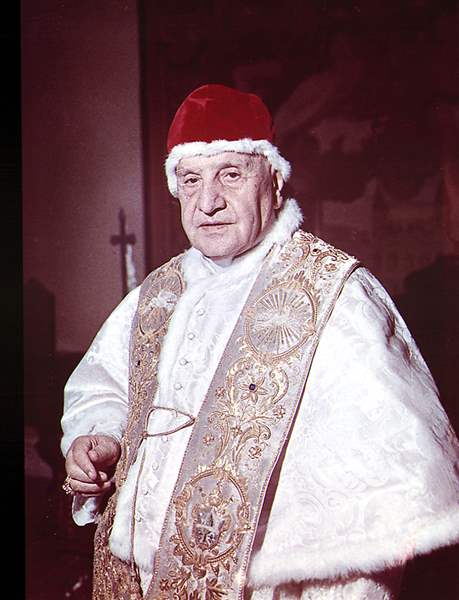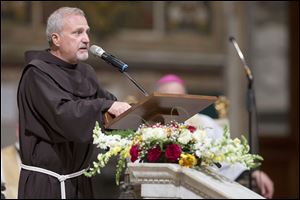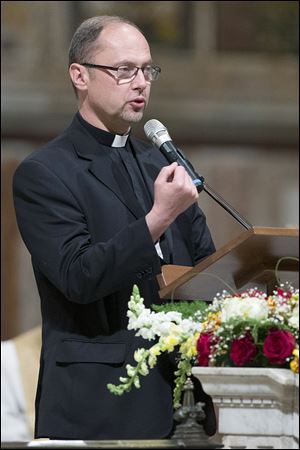
Legacy of Pope John XXIII ‘dynamic’
His changes and teachings endurewith sainthood near, officials say
4/22/2014
Pope John XXIII initiated the Second Vatican Council, which ushered in the most sweeping church reforms in centuries, and issued landmark teachings on peace.
ASSOCIATED PRESS

The Rev. Giovangiuseppe Califano, postulator of Pope John XXIII, delivers his speech while meeting with youths in Rome’s St. John Lateran Basilica on Tuesday.
PITTSBURGH — Coming of age in the 1950s, in the last years of the papacy of Pope Pius XII, the Rev. John Oesterle said his childhood image of a pope was of someone “very pious and frail and otherworldly.”
But after Pius died in 1958, he was succeeded by Pope John XXIII who, despite his savvy as a church administrator and diplomat, still exuded the warm simplicity of his Italian peasant roots.
Here was a pope appearing “so dynamic and alive,” recalled Father Oesterle, now a chaplain in Pittsburgh. “John XXIII was just dramatically different. I can’t imagine my life and priesthood of 47 years without Pope John.”
Before the Francis Effect, there was the John Effect.
Just as current Pope Francis has piqued the imaginations of Catholics and non-Catholics alike — with his literal embrace of the poor and ill, his denunciations of clerical privilege and economic injustice, and his openness toward those estranged from the church — Pope John XXIII had his own dramatic impact more than a half-century ago.

Pope John XXIII initiated the Second Vatican Council, which ushered in the most sweeping church reforms in centuries, and issued landmark teachings on peace.
On Sunday, Francis is scheduled to proclaim John a saint — along with Pope John Paul II, who was made a bishop by John XXIII and who made Francis a bishop during his own pontificate.
Elected at age 77, John XXIII defied expectations that he would be a caretaker pope. He launched the revolutionary Second Vatican Council of 1962-1965, which ushered in the most sweeping church reforms in centuries. He shed some regal trappings of the papal court and issued landmark teaching documents on peace and justice.
While Pope John died early in the council in 1963, bravely soldiering through a painful stomach cancer, his legacy is closely linked to that of the council — which paved the way for Masses in local languages instead of Latin, cooperation with Orthodox and Protestant Christians, rejection of anti-Semitism, dialogue with other religions, a ringing affirmation of freedom of conscience, and a call for all Catholics, not just a clerical elite, to live holy lives.
As much as anything, though, Pope John is remembered for his courageous yet gentle demeanor — a smiling, rotund grandfatherly type known for his spontaneous wit (when asked how many people worked at the Vatican, he said, “about half”) and for his warmth (memorably telling a late-night multitude in St. Peter’s Square, “Now go back home and give your little children a kiss — tell them it is from Pope John.”).
Subsequent popes such as Paul VI and John Paul II, while endorsing Vatican II, put boundaries on how far its reformist spirit could extend, reaffirming church opposition to artificial birth control, women priests, and homosexuality. With Pope Francis upholding those teachings but also possessing the charisma to connect with those marginalized by them, Pope John’s legacy as a bridge-builder is in some ways more relevant than in decades.
“I do see Pope Francis as a man more in the mold of John XXIII,” said John Thavis, author of The Vatican Diaries, a memoir of nearly three decades covering Rome for Catholic News Service. “He has a simpler approach to the faith and to evangelization.”
Nicholas Cafardi, dean meritus and professor of law at Duquesne University in Pittsburgh who has long been involved in church lay leadership, said the parents of the Argentine-born Jorge Bergoglio, the future Pope Francis, had the same Northern Italian roots as Angelo Roncalli, who became John XXIII.
When he sees Pope Francis, Mr. Cafardi said, “I see Roncalli.”
And Pope John’s generosity — giving virtually all his money to help family and the needy — also recalls Pope Francis’ shunning of ritzy possessions. The Rev. Jerome Vereb, a Pittsburgh priest who worked for years at the Vatican, recalled visiting with a close associate of Pope John who showed him the late pope’s thin wallet as it was at the time of his death.
“I didn’t recognize it as a wallet,” he said. “He had not a penny in that wallet.”
As a young priest, Father Roncalli supported the growing labor movement and the “worker priests” who saw an inseparable link between earthly justice and spiritual virtue.

Msgr. Slawomir Oder, postulator of late Pope John Paul II, delivers his speech in Rome’s St. John Lateran Basilica on Tuesday. The meeting was organized to prepare for Sunday’s elevation to sainthood of Pope John Paul II and Pope John XXIII.
He served throughout Europe as a Vatican diplomat, taking sacraments to Catholics in remote reaches, sheltering Jews during the Holocaust, bringing relief to refugees from war and disaster, and engaging in dialogues with everyone from communists to Muslims to Orthodox Christians.
He would build on that work years later as pope. Acknowledging the high wall of division between Catholic and Orthodox, he said, “I try to pull out a brick here and there.” In a meeting with Jewish visitors, he alluded to a biblical tale of family separation and reconciliation with the words, “I am Joseph, your brother.”
Sister Betty Sundry of Pittsburgh recalls the power of Pope John XXIII’s landmark encyclical, or teaching document, on Peace on Earth. The 1963 document was groundbreaking for calling on not just Catholics but all people of “good will” to pull back from the nuclear brink and promote peace with justice.
Even today, “I quote that document a lot whenever I give talks about life issues and peace,” said Sister Betty, director of social concerns for the Sisters of Divine Providence. She has been a member for 60 years.
Pope John backed up his words with action — opening channels with U.S. and Soviet leaders to broker a face-saving way out of the Cuban missile crisis.
Father Oesterle recalled eagerly studying the hot-off-the-press council documents with classmates at St. Meinrad Seminary in Indiana in the 1960s.
“When I was growing up, the goal was to have a bigger and better church, and if people didn’t want to be engaged, well too bad,” he said. “It was just incredible to me that the bishops were basically envisioning a whole new kind of church engaged with the world, not frozen with Latin, and [proclaiming] the church as the people of God.”
He added: “It seemed to me that everybody would jump on the bandwagon. That was part of my naivete coming out of seminary.”
Some of the opposition was to the suddenness of the changes, such as the lurch away from the Latin Mass.
But over the decades, the council developed conservative critics who linked it to the root of a plunging number of new priests and nuns in the United States and other Western countries and complained of a casual irreverence among many toward the Mass.
Progressives who embraced the council lamented what they saw as a loss of its consultative nature in subsequent top-down papal decisions on issues of gender and sexuality.
Pope Francis has repeatedly said he is a “son of the church” and loyal to its teachings. But his shift to a more pastoral tone reminds many of Pope John XXIII.
“John XXIII was not a liberal,” Father Vereb said. “But he did say, ‘Let us open the windows and let us listen,’ because the church is irrelevant if it is not listening to the world.”
The Block News Alliance consists of The Blade and the Pittsburgh Post-Gazette. Peter Smith is a reporter for the Post-Gazette.
Contact Peter Smith at: petersmith@post-gazette.com, 412-263-1416, or on Twitter @PG_PeterSmith.